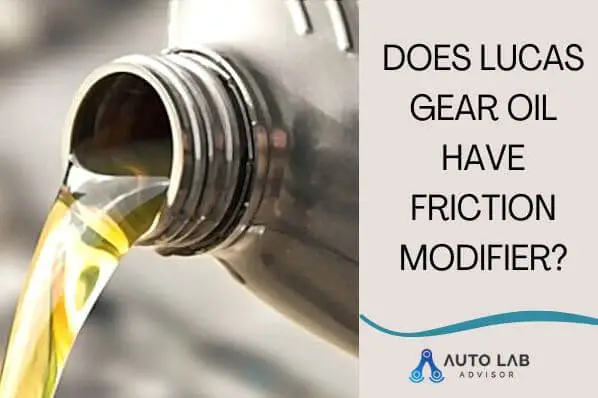Adding engine oil to your vehicle’s engine can reduce the wear and tear in the engine components and increase the lifespan. Also, when you add motor oil, it helps to increase fuel efficiency, cleans the engine, protects the engine from overheating, and improves the engine performance. However, engine oil cannot offer all these by itself. It requires several additives in its formula to provide all these benefits. That’s why motor oils have friction modifiers, anti-oxidant, corrosion resistance, AW agents, detergents, and anti-foaming agents in their formula.
But does Lucas gear oil have friction modifier?
Or should you add the friction modifier separately?
Do you really need to add the friction modifier to your car’s engine?
Although it is not clearly mentioned on the product’s label, Lucas gear oil has the friction modifier additive in its formula. Thus, when you add the Lucas gear oil to your vehicle’s engine, engine components gest protected from wear, resulting in higher fuel efficiency and superior engine performance.

Does Lucas Gear Oil have Friction Modifier?
When you add Lucas gear oil to your vehicle’s engine, you don’t have to use a friction modifier separately.
What does Friction Modifier Do?
Friction modifier or boundary lubrication additive modifies the coefficient of friction. Usually, most engine oils have this friction modifier in their formula. As this friction modifier works as an anti-wear additive, adding it to your vehicle’s engine can minimize the metal surface contact and slow down the wear in the engine parts. Thus, you will be able to have higher fuel efficiency and a longer engine lifespan.
How Friction Modifier Works?
To better understand how friction modifier functions in the engine, we must go to molecular levels. A friction modifier or boundary lubrication additive has two parts- polar and oil-soluble tail.
When you add the friction modifier to your vehicle’s engine, its polar part gets itself attached to the metal surface of the engine components, and the tail works as a carpet. Thus, it creates a thick boundary between the metal components and minimizes the surface contact.
2 Things to Consider Before Using Gear Oil
1. Viscosity Grade
Before purchasing gear oil, you will have to consider the viscosity grade or how thick or thin the motor oil is. If you are in a hot condition, you will have to use a motor oil that has a higher viscosity grade or is thick. But if you are driving in winter or snowy conditions, you will have to add engine oil that has a lower viscosity. Because if you add engine oil with high viscosity, it will get coagulated in cold conditions. Thus, it will trap the heat in your vehicle’s engine and make the engine overheat.
2. Motor Oil Type
Apart from the viscosity grade, you will have to consider the motor oil type. If you have a newer engine, you should add mineral engine oil until the break-in period is over. And as soon as the break-in period of the engine is over, you should switch to synthetic gear oil. Thus, you will be able to get high performance from the car’s engine.
Pro-Tip
While selecting the gear oil brand, ensure that it is mentioned or recommended in the car’s manual. Because if you use gear oil that is not recommended by your car manufacturer, your car’s warranty will be void. However, as the Lucas Gear Oil provides superior quality and has a good reputation in the automotive market, most car manufacturers recommend this gear oil.
Lucas Gear Oil Review
If you are looking for a gear oil for heavy-duty usage, you can use the Lucas Oil 10042 SAE Gear Oil 85W140 in your engine’s vehicle. This gear oil contains several additives which protect the engine from wear and friction. Besides, it protects the engine from overheating.
While doing in-depth research about this gear oil, we interviewed several automotive experts and vehicle owners about the performance. Unsurprisingly, every interviewee has provided a positive review about this gear oil. Besides, they have noticed an enhancement in the engine’s performance after adding this Lucas gear oil to their vehicle.
Frequently Asked Questions about Lucas Gear Oil
Apart from protecting the engine parts from wear, it has several functions. For example, a friction modifier can work as an anti-oxidant. Besides, it protects the engine metal parts from corrosion and helps increase the engine lifespan.
Yes, Lucas gear oil has limited slip additive along with other gear oil additives. With the combination of all these additives, Lucas gear oil increases the lifespan of the bearing and minimizes the engine noise. Besides, because of these additives, Lucas gear oil doesn’t lose its lubricity even at a high temperature.
If you are using the Lucas gear oil, there is no need to add a friction modifier to your vehicle’s engine separately. However, if you use gear oil from other brands and don’t have the friction modifier in its formula, you will have to add a friction modifier to your car’s engine separately.
Yes, Lucas gear oil consists of all the necessary additives that protect the engine components from oxidants, dirt, overheating, excessive friction, etc. Thus, by adding the Lucas gear oil to your car’s engine, you can get superior performance and increase the engine lifespan.
Conclusion
If you want to protect the engine components from wear and improve fuel efficiency, you will have to add a friction modifier to your vehicle’s engine. And as the Lucas gear oil has this additive in it, you can simply add the Lucas Motor Oil, and you won’t have to worry about adding a friction modifier separately.
